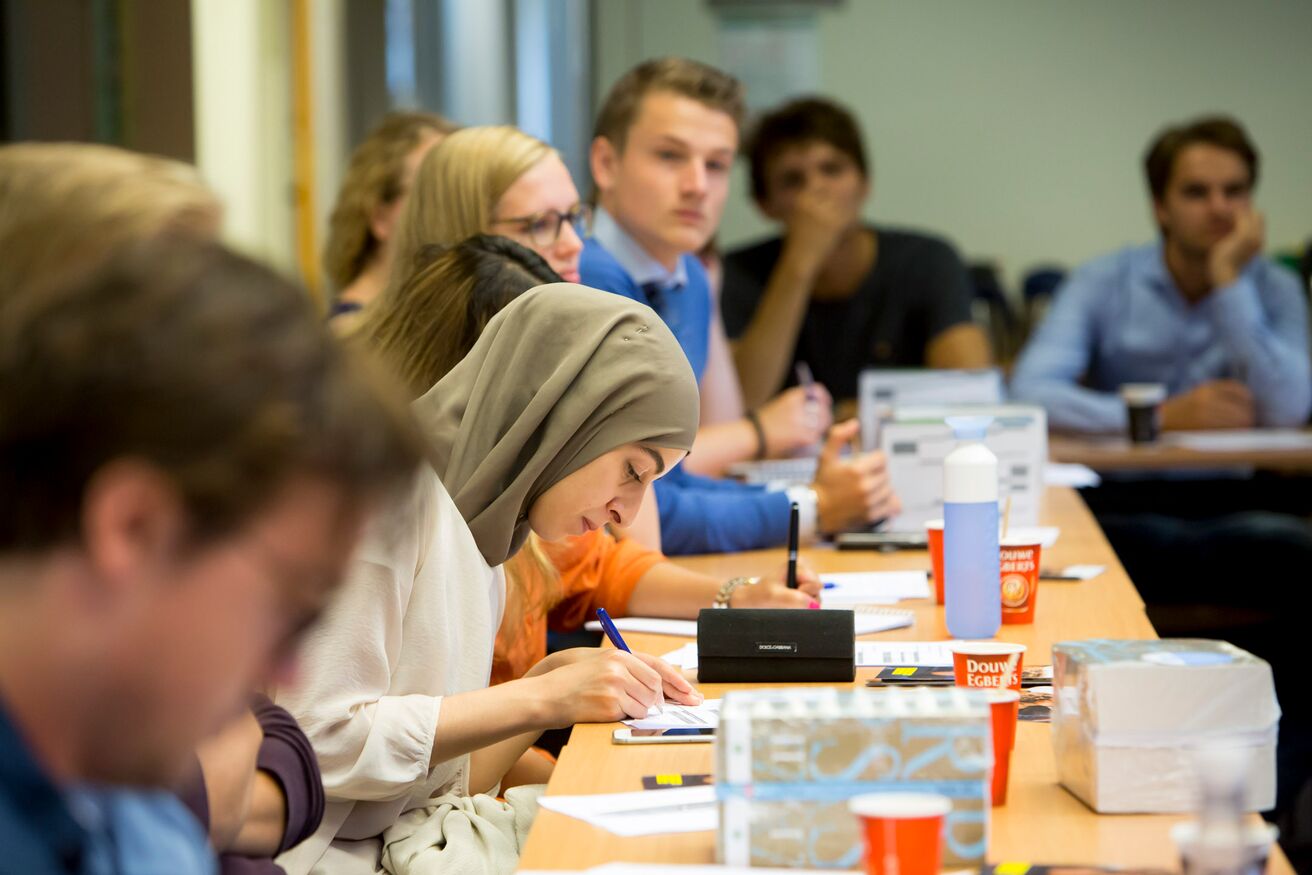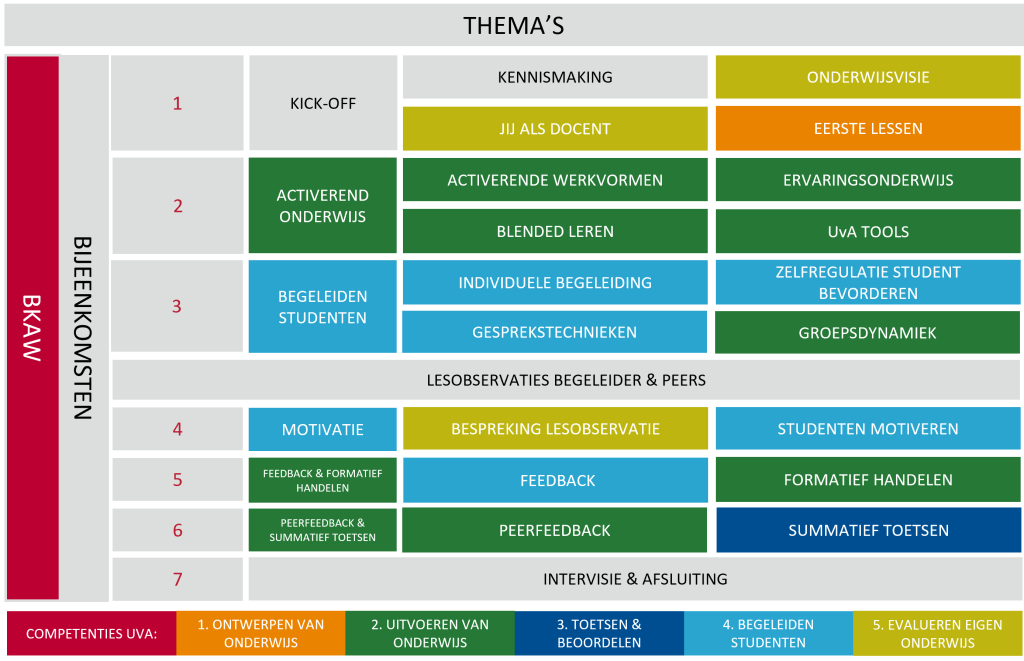
Basic didactics – Amsterdam Law Faculty
Are you a starting teacher? Then the Basic Academic Workgroup Teaching Qualification (Basiskwalificatie academisch werkgroeponderwijs/BKAW) is the professionalisation programme to follow. During this programme, you will learn the basic skills for (skills) workgroup teaching; in particular, the competences of conducting and evaluating teaching and supervising students are central. Peak lecturers and PHDs can also take part in this programme; meeting 1 to 3 in particular are relevant.
The BKAW path aims to provide starting (skills and working group teaching) teachers with the best possible didiactical support during the first year. By following this path, starting lecturers become proficient in implementing and evaluating teaching and in supervising students.
The aim is for starting academic skills teachers and starting ‘teachers-4’ to go through this programme together. In addition, session 1 and 2 of the programme are ideally suited for peak teachers to acquire the necessary basic didactic knowledge.
Starting UvA lecturers in the Faculty of Law (teachers-4, academic skills teachers and peak lecturers)
55 hours (30 hours of contact time, 20 hours of preparation and 5 hours of lesson observation)
The BKAW-meetings:
In this kick-off meeting, besides getting acquainted, the focus is on the ‘vision of education’ and the role a teacher plays in it. We let the starting lecturers reflect on what makes a good lecturer and what qualities this person possesses. We also look at the different roles a university has. In addition, in this session we give lecturers some tools to prepare for their first lessons.
After the session, you will be able to:
- carry out some introductory work forms yourself in a classroom setting;
- describe your role as a teacher within the organisation and team in which you work;
- make a personal qualification of a good teacher and what this means for your own development points;
- use the Teaching Plan format, design your own lesson plan and add learning activities to prepare for the first teaching period.
This meeting focuses on activating education. One of the main goals within educational innovation is to make more use of more modern teaching methods such as experiential and blended learning. In this session, lecturers will apply various activating teaching methods themselves. We will also cover the UvA supported tools and how to use them didactically
After the session, you will be able to:
- carry out a lesson yourself in which the principles of activating teaching are expressed;
- apply various activating teaching methods in your own teaching practice;
- apply the principles of experiential education: in your own teaching practice for skills teachers and in context-rich assignments for regular teachers-4;
- deploy UvA-supported tools to enrich online and physical education.
This session focuses on supervising individual students. Mentorship and its responsibilities are also discussed. Furthermore, this day will focus on conversation techniques (in one-to-one contact) and group dynamics. We will also look at what methods you can use as a teacher to promote students’ self-regulation.
After the session, you will be able to:
- apply motivational interviewing techniques with individual students;
- encourage group formation to create a safe learning environment;
- apply guidance techniques to promote students’ self-regulation;
- respond to the (basic) situation and interests of students, taking diversity into account, in order to create an inclusive and socially safe learning environment.
This meeting focuses on the topic of motivation. What motivation theories exist and what do they teach us about how students can be motivated. In addition, we reflect on the lesson observations we have made. We look at which (conversation) techniques, behaviour and attitude had a positive influence on students’ motivation. In addition, we focus on how activating the teaching was: to what extent was the learning process of the student central (rather than the treatment efficiency of the teacher) and we look at whether elements of experiential learning and blended learning recurred in the lesson.
After the session, you will be able to:
- on the basis of various motivation theories, apply techniques yourself that try to promote student motivation;
- reflect on your actions as a teacher based on the lesson observations.
This session focuses on feedback and formative practice. Feedback has a great effect on the learning process of students. When students receive feedback, they see where they are in their learning process: what they are already good at and what they still need to work on to eventually master the learning objectives. We will also talk about formative practice, what it exactly is and how to implement it in your teaching.
After the session, you will be able to:
- formulate effective feedback that contributes to the recipient’s learning process;
- apply the principles of formative acting in your own teaching practice and use them to adjust the learning process of students if necessary.
In this session, we will discuss peer feedback and summative testing. The feedback focus is shifted to student-student and we conclude with summative testing.
After the session, you will be able to:
- use peer feedback efficiently and effectively in teaching;
- identify the student learning process and the role of the teacher in peer feedback;
- recognise the similarities and differences between formative feedback and summative assessment;
- evaluate whether teaching activities and summative assessment are sufficiently aligned.
The final meeting is devoted to reflection on your own development during the past period and for the future, after obtaining your BKAW. You present what the BKAW trajectory has brought you and what kind of teacher you want to be; what do you (still) need to develop further and who or what do you need for this?
After the session, you will be able to:
- reflect on your actions as a teacher in teaching and your role in the teaching team;
- reflect on your growth and development as a teacher based on feedback, evaluations and results.






